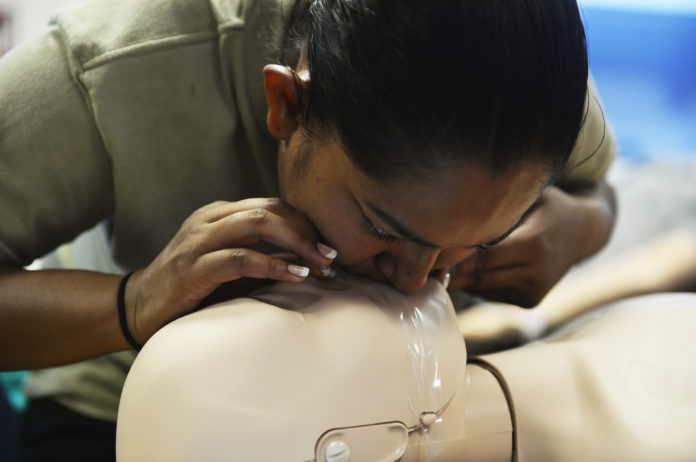Poor cardiopulmonary resuscitation (CPR) training and awareness leave patients who suffer cardiac events outside hospital settings, with preventable permanent brain damage
It was a Sunday like any another when Mr Samir Ahuja (name changed), a 54 year old banker became suddenly unresponsive following symptoms of discomfort in chest. Family and neighbours didn’t know what to do and rushed him to the nearby hospital after repeatedly sprinkling water on his face.
He was immediately intubated and put on mechanical ventilatory support. Brain MRI showed irreversible hypoxic brain damage ( due to oxygen unavailability to the brain). Mr. Ahuja is currently lying in a vegetative state with normal vital signs (normal blood pressure, pulse rate, respiratory rate and temperature) but no responses.
Of the 56.5% of OHCA events witnessed by bystanders about 92.5% occur at home. Only 1.3% of these arrests received CPR by bystanders.
Out of Hospital Cardiac Arrests
Out of hospital cardiac arrest (OHCA) as defined by CDC, is cessation of cardiac mechanical activity that occurs outside the hospital setting and is confirmed by the absence of signs of circulation. OHCA is a leading cause of global mortality and each year 3,56,000 patients suffer from it in the USA. Globally it is estimated that less than 10% of patients survive OHCA. Indian data is however hard to find.
The greatest impact on survival is of the time taken to initiate cardiopulmonary resuscitation, commonly known as CPR. Cardiopulmonary resuscitation (CPR) is a lifesaving technique useful in many emergencies, including a heart attack or near drowning, in which someone’s breathing or heartbeat has stopped.
OHCA is also one of the leading causes of death in India but there are very few studies. The lack of knowledge of CPR and training among bystanders in the community, and absent/ delayed emergency response systems is the main reason why most OHCA patients in India do not get appropriate and timely CPR.
Why CPR?
According to the recent Cardiac Arrest Resuscitation Outcome study (also known as CARO study) carried out in one of the major hospitals of the country, of the 56.5% of OHCA events witnessed by bystanders about 92.5% occur at home. The study was published in the World Journal of Emergency Medicine. What is alarming is that only 1.3% of these arrests received CPR by bystanders.
This is very poor when we compare to the western world where 18 – 55% of patient’s receive CPR from bystanders. This is crucial as lack of perfusion (circulation of blood) leading to irreversible cell death in brain leads to poor outcome. CPR along with the access to external defibrillators (devices to restore the normal rhythm of the heart) have the potential to improve outcomes in all patients of cardiac arrest outside the hospital.
The study also showed that early initiation of CPR by bystanders, CPR duration of less than 20 minutes, and OHCA where the source of the problem is not the heart, are associated with good outcome. Non-existent National policy on OHCA, deficient training of available manpower, absent/delayed emergency medical services (EMS) and lack of mass education about bystander CPR are crucial lacunae.
Need for CPR training
Pre-hospital management strategy at a community level includes mass awareness about whom to resuscitate, when to resuscitate and how to resuscitate. People also need training on how to manage resuscitated patients before arrival to hospital/emergency medical services. In spite of great strides in hospital care, lack of a comprehensive and unified national emergency medical system and set EMS guidelines and protocols are hampering patients’ prognosis. Bystander education on CPR is of extreme importance; most OHCA cases in India do not get timely interventions.
Proper CPR training as part of school syllabus or before graduation is the need of the hour. It is also important to carry out mass awareness through prime time advertisements.


